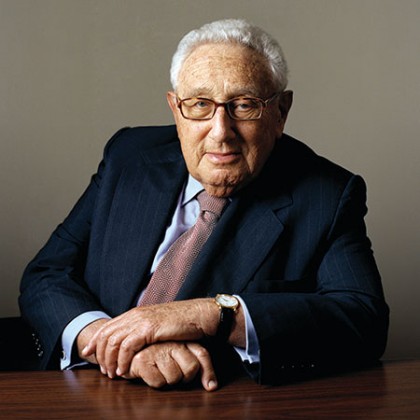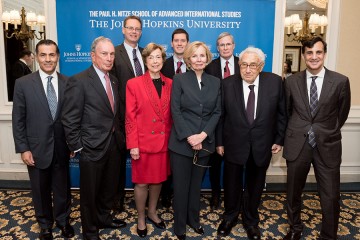- Name
- Asma Yousef
- ayousef4@jhu.edu
- Cell phone
- 771-200-6659
Henry Kissinger, a scholar and diplomat who served in the administrations of Presidents Richard Nixon and Gerald Ford and is widely considered one of the most consequential statesmen in American history, died Wednesday at his home in Connecticut. He was 100.

Image caption: Henry A. Kissinger
Image credit: jU?rgen frank
Johns Hopkins University created the Henry A. Kissinger Center for Global Affairs at its School of Advanced International Studies in 2016 to promote the serious study and practice of historically informed statecraft and strategy, which characterized Kissinger's remarkable career as a policymaker and scholar. Kissinger avidly supported both the Kissinger Center and SAIS' mission of generating innovative research that spoke to the world's most pressing problems while training the next generation of national and global leaders.
At the launch of the Kissinger Center, JHU President Ron Daniels captured Kissinger's legacy and the ambitious aims of the center named in his honor, saying: "This center is named for a scholar-practitioner known for his strategic acumen, his preternatural ability to think 15 moves ahead in any international negotiation, and his deftness in mining history for insights that foretell future action on the world stage. So many were drawn not only to honoring his legacy, but also, in doing so, to building the scaffolding to reset the way we understand geostrategy and teach the practice of statecraft for the 21st Century and beyond."
Francis Gavin, director of the Kissinger Center, said "I am deeply saddened at Dr. Kissinger's passing. I remain forever grateful for the remarkable and unqualified support, wisdom, and friendship he provided from the moment I came to the center. We will continue to pursue his vision for a deep engagement with history to meet the challenges of the future."
Kissinger pioneered the application of historical lessons to current and future policy. This legacy is reflected in the center's flagship course, the Kissinger Seminar in Statecraft and Strategy, taught by SAIS Dean James Steinberg, Gavin, and Kissinger Distinguished Professor Hal Brands. Kissinger met virtually with the students each year, a highlight of the course, to share his vision of America's vital role in a changing world while answering questions about his life and career.
"Henry Kissinger was the epitome of the scholar-statesman, marrying rigor and intellectual depth with a keen appreciation of the opportunities and constraints of international politics—the very ideals we seek to nurture at SAIS," Steinberg said. "Both as a policymaker and teacher, I was privileged to benefit from his advice and counsel over many years. I am especially grateful for the warm support and guidance he provided when I became dean. We will miss his invaluable presence but will honor his legacy the best way we know how—by educating future national and global leaders to follow in his footsteps."
Born in Fürth, Germany in 1923, Kissinger fled Nazi Germany with his family in 1938 and moved to New York City. He served in the U.S. Army in Europe during the Second World War and was awarded a Bronze Star. After earning his undergraduate degree and PhD at Harvard University, Kissinger embarked on an extraordinary scholarly career, writing on subjects ranging from the Congress of Vienna to the revolutionary role of thermonuclear weapons on world politics.
Kissinger consulted for both the John F. Kennedy and Lyndon B. Johnson administrations before serving as national security adviser and secretary of state in the Nixon and Ford administrations. He negotiated nuclear weapons and anti-ballistic missile treaties with the Soviet Union and laid the groundwork for Nixon's breakthrough visit to China in 1972. He negotiated for the United States at the Paris peace talks that led to the end of the Vietnam War.
After his time in office, he started Kissinger Associates while publishing many important books, including White House Years, Diplomacy, On China, World Order and Leadership: Six Studies in World Strategy. He was widely sought after by global leaders and American presidents for his advice and counsel, and actively shaped debates on world affairs into his 100th year.
At SAIS, Kissinger chaired the Kissinger Center's America and the Future of World Order Program, an effort to craft innovative and effective grand strategies for the U.S. in the face of a complex and rapidly changing world order. As part of this program, Kissinger presided over a small working group that included Bloomberg LP and Bloomberg Philanthropies founder, former New York City mayor, and Johns Hopkins alumnus Michael R. Bloomberg, former Google CEO Eric Schmidt, current National Security Advisor Jake Sullivan, and current director of the Central Intelligence Agency, William Burns, among other distinguished scholars and practitioners. These meetings emulated the famed gathering on world order held at Bellagio, Italy, in 1965, which Kissinger believed was formative to his thinking on foreign policy and international politics.









